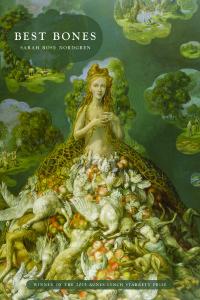
Best Bones by Sarah Rose Nordgren
a review by J.P. Grasser
University of Pittsburgh Press
2014
88 pages
$15.95
The Sound of Rushing
Fables & fairytales function, in part, by a genius mechanism of distance; horror and misfortune often belong to animals, didactic ends usually outweigh catastrophic climaxes, and the magical guards against the brunt of full emotional force—reality is terrifying. As children, we enjoy terror from the safe remove of a loved-one’s lap. Rereading fairytales as adults, however, often paints a grimmer picture. If it couldn’t really happen, it couldn’t happen to me…could it?
Best Bones operates precisely through this breed of remove. As Nordgren puts it in “Still Birth”—“Content usually roots / story to ground, but I sense it […] replaced with the sound of rushing.” And a rush it is, reading Nordgren’s debut collection. This reader sped cover to cover the first time around, before circling back for more (without even refueling on coffee).
In the tradition of magical-realism, Best Bones tends toward the real, hauntingly so, and supplies a cast of deformed characters & distorted images. In the tradition of religious or metaphysical poetry, the transcendent is here figured as corporeal, the bodily, elevated. In the tradition of elegiac verse, the ledger of the missing goes on ad infinitum. Nordgren’s tri-modal craft coalesces most clearly, perhaps, in poems like “The Lord is Risen Indeed,” “White Sheep. White Cloud.,” and “Mary,” in which she writes:
There was a hypothetical pregnancy.
The woman in question accumulated a box full
of video cassettes featuring pregnant
characters. She wore beads around her waist
and sat up late in bed with a shawl
of her own hair. Roommates circles
her like roosters, offering her most tender
bites of meat, and the apartment
reeked of sweat and powder.
Though, what’s at stake here goes beyond these modes, however masterfully they are executed. Nordgren’s understanding of the self compels me most: her speakers are complicated, fragmented, refracted by our contemporary condition; her engagement with the domestic sphere and memory, her meticulous dissection of traditional gender-roles, her interrogation of desire’s intricacies & intimacies—win me over completely. The collection reaches fever-pitch with the dizzying breadth & breathlessness of “Don’t,” in which Nordgren writes, “There is hatching in the lighter / and darker shadow // kisses to end the note, / and ribbons up the back that tie me in. […] For this, I walk each morning / the railroad’s tired path below black // winter branches // with laces tightly knotted / like chromosomes.” I find an unwilling, yet prescient, acknowledgement of the constructions from which one weaves an identity, by which one’s identity is bound; absence transmuted to utterance.
Inasmuch as the images are full-bodied in Nordgren’s collection, the speakers are often disembodied—more ghostly presences, than fully present. The solid forms, sound-patterning, and, at times, heavy enjambments anchor the collection’s pervasive dreamscape, creating that duality, that sly duplicity, good contemporary poetry affords. It’s a book of sensory experience more than logical sense, but that experience is sure not to disappoint. And as for a didactic end, a little something to dull the catastrophe? Perhaps the moral here is, there is no moral when examined up-close, give it a little distance, let it breathe.
 J.P. Grasser’s poetry explores the diverse regions he has called home, most insistently his family’s fish hatchery in Brady, Nebraska. He studied English & Creative Writing at Sewanee: The University of the South and received his MFA in poetry from Johns Hopkins University. His new work is forthcoming from Linebreak, diode, and The Adroit Journal; previously published work appears in 32 Poems, Prairie Schooner, Crab Orchard Review, West Branch Wired, The Journal, Ninth Letter Online, and Redivider, among others. He currently lives in Salt Lake City, where he is a PhD candidate in Literature & Creative Writing. Find him online at www.jpgrasser.com.
J.P. Grasser’s poetry explores the diverse regions he has called home, most insistently his family’s fish hatchery in Brady, Nebraska. He studied English & Creative Writing at Sewanee: The University of the South and received his MFA in poetry from Johns Hopkins University. His new work is forthcoming from Linebreak, diode, and The Adroit Journal; previously published work appears in 32 Poems, Prairie Schooner, Crab Orchard Review, West Branch Wired, The Journal, Ninth Letter Online, and Redivider, among others. He currently lives in Salt Lake City, where he is a PhD candidate in Literature & Creative Writing. Find him online at www.jpgrasser.com.